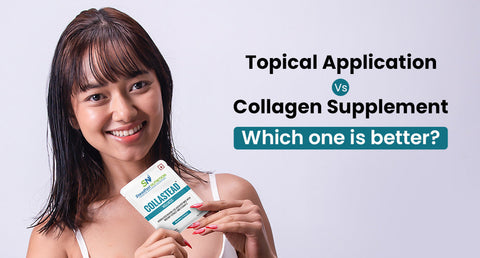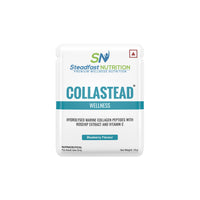Table of Content
Collagen is essential for maintaining skin firmness and elasticity, but its production decreases with age, leading to wrinkles and sagging of skin. Collagen supplements, available in forms like capsules, powders, and liquids, aim to boost the body's collagen levels, supporting skin health, joint function, and connective tissues. These supplements are sourced from both animals - bovine and marine sources - and plants.
While many use collagen supplements for skin to improve skin elasticity and reduce wrinkles, studies are still ongoing on their effectiveness. Consulting a healthcare professional before starting collagen supplementation is recommended.
Topical application vs collagen supplements
Collagen supplements are generally more effective than topical collagen for enhancing skin health. While topical products provide temporary surface benefits like maintaining hydration, collagen molecules are often too large to penetrate deeply. In contrast, collagen supplements, taken orally, offer essential amino acids that support natural collagen synthesis, improving skin elasticity, hydration, and reducing wrinkles from within.
Key Differences:
1. Absorption: Topical collagen works on the surface, while collagen supplements are absorbed internally for deeper benefits.2. Scope: Topical application increases elasticity of the particular skin surface; collagen supplements improve skin elasticity and hydration and benefit joints, nails, and connective tissues.
3. Longevity: Topical application offers short-term effects, while collagen supplements provide long-term improvements.
4. Convenience: Topicals are easy to apply, while collagen supplements require regular intake for lasting results.
Collagen supplements are more effective for comprehensive, long-lasting skin and health benefits.
What is collagen?
Collagen is the most abundant structural protein in animals, primarily composed of the amino acids glycine, proline, and hydroxyproline. It plays a crucial role in maintaining the structure of skin, tendons, bones, and cartilage and supports connective tissues. The body produces less collagen as we age, leading to wrinkles, sagging skin, and slower tissue repair. Factors like sun exposure and smoking can hinder collagen synthesis.
While topical products are limited in effectiveness due to the large size of collagen molecules, hydrolyzed collagen supplements are broken down for better absorption and may stimulate natural collagen production, improving skin elasticity, hydration, and reducing wrinkles.
What is Topical Application of Collagen?
Collagen is often described as the skin's "mortar," as it binds cells and tissues together, providing essential strength and elasticity. However, as we age, the body’s natural collagen production decreases, leading to common signs of ageing such as wrinkles, fine lines, and sagging skin. Topical collagen products and targeted treatment including creams and serums aim to combat these effects by enhancing skin elasticity and retaining moisture.
Collagen molecules in topical products are too large to penetrate deeply into the skin but can effectively hydrate the outer layer, temporarily smoothing fine lines and creating a skin plumping effect. Many formulations include additional ingredients like hyaluronic acid for moisture retention, vitamin C for collagen synthesis, and peptides for skin repair. While they provide immediate surface-level benefits, they do not significantly boost long-term collagen production.
Hydrolyzed collagen, made of smaller fragments, can penetrate the outer layer of the skin (stratum corneum) to improve moisture and reduce visible signs of aging, such as wrinkles and dryness. For effective results, it's essential to choose creams with hydrolyzed collagen or consider ingestible collagen supplements for a more direct impact.
Why Collagen Supplements?
Oral collagen supplements for skin and connective tissues, often in the form of hydrolyzed collagen, are designed to enhance the body's natural production by breaking down collagen into smaller peptides for easy digestion and absorption. These supplements have been shown to improve skin health by increasing moisture levels, boosting elasticity, and reducing wrinkles and roughness. Additionally, oral collagen supports hair, nails, joint health, reduces bloating and improves mild digestive symptoms.
While oral supplements can deliver visible benefits over time, results vary among individuals and typically require consistent use. It's important to note that oral collagen isn't a quick fix and may take weeks to show improvements. Research, including a meta-analysis of 26 trials, supports the positive effects of hydrolyzed collagen on skin hydration and elasticity. However, more large-scale studies are needed to solidify these findings.
A review of 19 studies involving 1,125 participants, published in the International Journal of Dermatology, found that those taking collagen supplements saw improvements in skin firmness, suppleness, and moisture, with reduced wrinkles. However, these supplements often contained additional ingredients like vitamins, minerals, and hyaluronic acid, making it unclear if collagen alone caused the improvements. Some trials showed that collagen peptides (prolylhydroxyproline and hydroxyprolylglycine) may improve skin moisture and elasticity, but larger studies are needed to confirm the safety and effectiveness of commercially available products.
While collagen supplements may help, sun protection and topical retinoids are more effective for improving skin texture and elasticity. If trying collagen, choose products with minimal additives. Oral collagen supplements are necessary for athletes and sportspersons, reducing the risk of injury by strengthening joints, tendons, ligaments, and connective tissue, and expediting recovery. Collagen contains amino acids which enhance muscle tissue regeneration, reducing muscle soreness.
Comparing Effectiveness - Topical Application & Collagen Supplement
Opting for oral collagen supplements or incorporating collagen-rich foods into your diet is generally more effective than topical applications. While topical collagen products provide surface-level hydration and may temporarily improve the appearance of fine lines, they are limited by the large size of collagen molecules, which cannot penetrate the skin’s barrier. As a result, they do not stimulate collagen production in deeper layers of the skin. In contrast, supplements, broken down into smaller, easily absorbed peptides, work from within. These supplements enhance the body's natural collagen production, benefiting not only skin elasticity and hydration but also hair, nail, and joint health. Although the effects of supplements take longer to manifest, they provide a more lasting and comprehensive improvement in overall skin health and body rejuvenation than topical products.
Choosing What’s Best for You
A balanced diet, rich in protein and vitamin C is essential for healthy collagen production. Animal products like meat, fish, and poultry are rich in collagen, while vegetarians can opt for protein sources such as beans, legumes, eggs, and dairy. Foods high in vitamin C, like citrus fruits, peppers, and berries, also support collagen synthesis. If you maintain a nutritious diet, supplements may not be necessary. Collagen supplements like CollaStead from the house of Steadfast can further support the skin’s natural collagen, helping maintain firm and youthful skin. Each 10 g sachet contains 8 g of marine collagen peptides that enhance skin elasticity, reduce signs of ageing, and support joint health. Collastead is also enriched with rosehip extract, which has antioxidant and anti-inflammatory benefits, while vitamin C aids collagen synthesis. It's ideal for athletes, those with joint discomfort, and individuals seeking youthful skin and healthy hair. Between collagen creams and supplements, oral collagen is considered more beneficial for skin health.
As collagen cannot be completely derived from diet, supplementation may prove to be beneficial. If you're consuming a balanced diet rich in protein, such as meat, eggs, dairy, and beans, supplements may not be needed. Supplements can be beneficial not only for the skin but also for joint health.
Choosing topical collagen creams, with specific ingredients like retinoids or peptides, won’t boost collagen production, but they can hydrate and temporarily smooth the skin. The most important step is protecting your existing collagen by using sunscreen and maintaining a good skincare routine.


